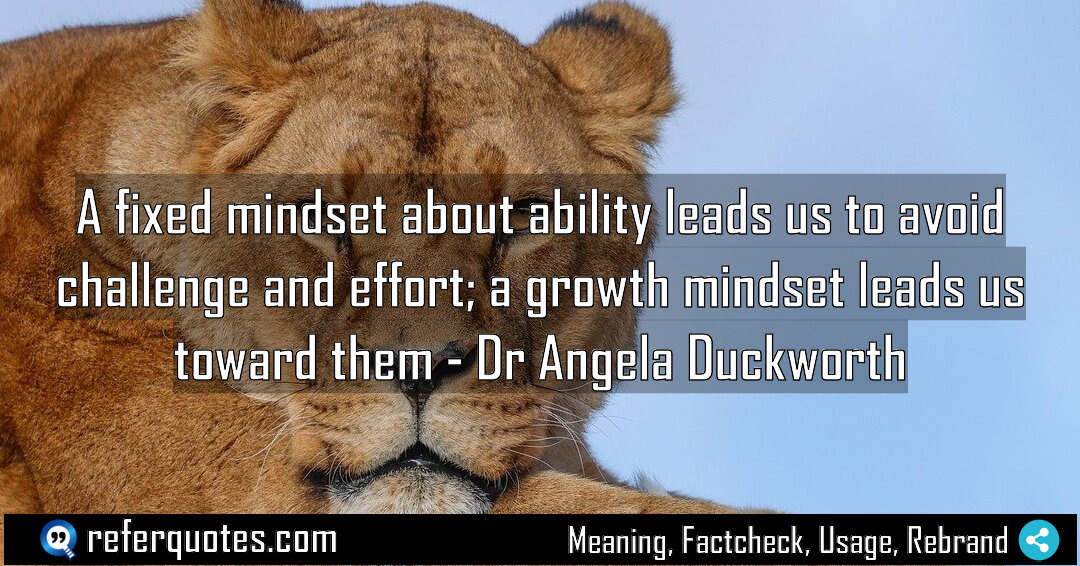You know, that idea that a fixed mindset about ability leads us to avoid challenge… it’s one of those concepts that completely reframes how you see success. It’s not just about trying harder; it’s about fundamentally rewiring your relationship with effort itself. This is the core of what separates high achievers from the rest.
Share Image Quote:Table of Contents
Meaning
At its heart, this quote is about the two basic psychological lenses we use to view our own abilities: one that sees them as static, and another that sees them as malleable. And that single belief dictates everything—whether you run from difficulty or run straight toward it.
Explanation
Let me break this down like I would for a client. A fixed mindset is this sneaky, internal narrative that tells you your intelligence, your talent, your “smarts” are just a fixed trait. You’ve got what you’ve got. So, what happens? You start avoiding challenges because if you fail, it’s not just a setback—it’s a verdict on your permanent ability. It’s a label. Effort becomes something to be wary of, because if you really have to try hard, maybe you just don’t have “it.”
Now, flip that. A growth mindset is the belief that your abilities are like muscles. They can be developed. They get stronger with use. With struggle. So, challenge isn’t a threat anymore; it’s the very thing that makes you smarter. Effort isn’t a sign of weakness; it’s the path to mastery. It’s the difference between seeing a difficult project and thinking “I’m not sure I can do this” versus “I’m not sure I can do this yet.” That one little word changes everything.
Quote Summary
| Context | Attributes |
|---|---|
| Original Language | English (3668) |
| Category | Education (260) |
| Topics | challenge (12), growth (413), mindset (133) |
| Literary Style | analytical (121), educational (37), motivational (245) |
| Emotion / Mood | inspiring (392) |
| Overall Quote Score | 80 (256) |
Origin & Factcheck
This is straight from Angela Duckworth’s 2016 book, Grit: The Power of Passion and Perseverance. Now, here’s a crucial piece of context people often miss: Duckworth is building directly on the seminal work of Stanford psychologist Carol Dweck, who literally coined the terms “fixed” and “growth” mindset. So while this is a Duckworth quote, the foundational concept is Dweck’s. It’s a perfect synthesis of two giants in the field.
Attribution Summary
| Context | Attributes |
|---|---|
| Author | Dr Angela Duckworth (58) |
| Source Type | Book (4032) |
| Source/Book Name | Grit: The Power of Passion and Perseverance (58) |
| Origin Timeperiod | 21st Century (1892) |
| Original Language | English (3668) |
| Authenticity | Verified (4032) |
Author Bio
Angela Duckworth is a University of Pennsylvania psychology professor and MacArthur Fellow whose research focuses on grit, self-control, and achievement. She taught middle school before earning her PhD at Penn and later founded Character Lab to advance the science of character development. Her bestseller Grit: The Power of Passion and Perseverance has shaped thinking in education and performance science. She co-hosts No Stupid Questions on the Freakonomics network. If you’re browsing the Angela Duckworth book list, you’ll find practical, research-backed guidance for cultivating passion and perseverance.
| Official Website
Where is this quotation located?
| Quotation | A fixed mindset about ability leads us to avoid challenge and effort; a growth mindset leads us toward them |
| Book Details | Publication Year/Date: 2016; ISBN/Unique Identifier: 978-1501111105; Last edition: Scribner 2016; Number of pages: 352 |
| Where is it? | Chapter 4: How Gritty Are You?, page 79 (2016 Edition) |
